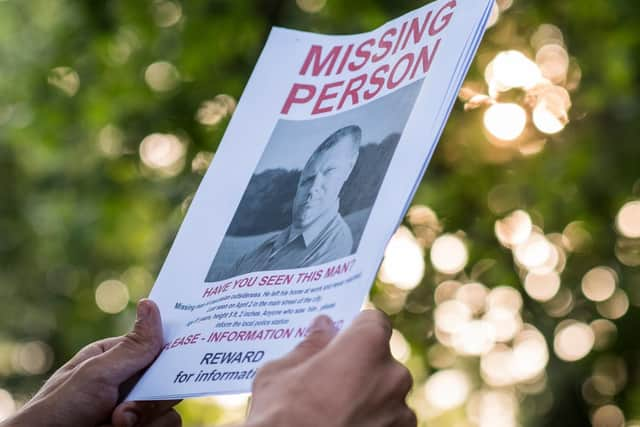Revealed: Thousands of people went missing last year in Hertfordshire
and live on Freeview channel 276
Hertfordshire Police has 72 people in the county who are classed as long term missing, 38 of them are children (under 18) and 34 are adults (over 18).
The force has dedicated officers and staff in the Safeguarding Command investigate all of the county’s missing people cases.
Advertisement
Hide AdAdvertisement
Hide AdThe JPI Data Unit found that in Hertfordshire there were 1,127 missing children recorded in 2018/19 (37.8%) and 1,857 missing adults recorded in the same period (62.2%).


Detective Chief Inspector Andrea Dalton, from Hertfordshire Constabulary’s Safeguarding Command, said: “We have dedicated officers and staff in the Safeguarding Command who work hard to investigate all of the county’s missing people cases: they work in partnership with other agencies to apply problem solving techniques and reduce repeat missing episodes, as well as supporting frontline police officers with the proactive management of missing person investigations.
"These more often than not are high risk cases where significant risk has been identified in respect of the missing person, meaning substantial resources are allocated and fast-time enquiries carried out to help locate them safe and well.
"People go missing for a variety of reasons and it is our role as police role to firstly find them as quickly as possible, but to also engage with them to get to the root of why they went missing, and subsequently provide them with or signpost them to any help and support services they may need.”
Advertisement
Hide AdAdvertisement
Hide AdAcross the UK thousands of cases still remain unsolved, with the families of missing people and charities believing more can be done to tackle the problem.
Missing People charity said there needs to be more of a multi-agency response to prevent vulnerable people from further missing episodes.
A National Register of Missing Persons is currently being developed by the Home Office to improve understanding of missing incidents and to help data sharing across police forces.
The latest figures published by the National Crime Agency’s (NCA) Missing Persons Unit and analysed by the JPIMedia Data Unit, shows hundreds of thousands of missing person incidents were reported to police forces in 2018/19.
Advertisement
Hide AdAdvertisement
Hide AdIn England and Wales there were over 320,000 missing person incidents and over 158,000 individuals reported missing.
In Northern Ireland there were over 10,000 missing person incidents reported and over 5,000 individuals reported missing
In Scotland over 21,000 missing person incidents were reported and over 11,000 individuals were reported missing.
Although the figures show hundreds of thousands of cases, changes in recording processes over the years has meant concrete comparisons between the yearly figures could not be made.
Advertisement
Hide AdAdvertisement
Hide AdHowever, the general trend of the nation-wide figures for England and Wales shows a five year rise in the number of missing person incidents — this was recognised by the NCA.
The NCA confirmed to the Data Unit that the number of missing people has been increasing since they started collecting and publishing figures but pointed out that the year-on-year increases started to level off in the 2017-2018 year.
Because of insufficient data a similar analysis could not be carried out for Northern Ireland and Scotland.
A National Register of Missing Persons (NRMP) is currently in development, overseen by the Home Office and expected to be delivered in 2023.
Advertisement
Hide AdAdvertisement
Hide AdA spokesperson for the Home Office said the NRMP will “significantly improve” their understanding of missing person incidents.
The Home Office said it will allow all forces in the UK to manually record missing and associated found incidents, and to access data about missing people from other force areas.
The spokesperson added: “It is vital that the police have access to fast and accurate data and intelligence that can be shared between forces.”
Jane Hunter, Senior Research and Impact Manager at Missing People charity said: “Whilst police rightly take the lead on investigations into disappearances, we’d like to see the return of a missing person as a moment that activates a multi-agency response, to identify which support measures should be put in place to safeguard and prevent further missing episodes.”
Advertisement
Hide AdAdvertisement
Hide AdJoe Apps, Head of the UK Missing Persons Unit at the National Crime Agency, added: “We continue to work with partners in law enforcement and the voluntary sector to identify risk, safeguard vulnerable people and support families and friends.”
There are many complex reasons as to why a person goes missing.
Analysis of the NCA data found mental health was the leading cause of 18-59 year olds going missing, while dementia (including Alzheimers) was the leading cause of over 60s going missing.
Relationships were the most common cause for children going missing.
Advertisement
Hide AdAdvertisement
Hide AdThe data also revealed more reported incidents involved men and boys than women and girls.
“Behind these figures are individual people, who may be experiencing mental health crises, problems where they live, exploitation, domestic violence, or a range of other issues,” explained Ms Hunter.
“And we must not forget those left behind, desperately searching for answers to their loved one’s whereabouts."